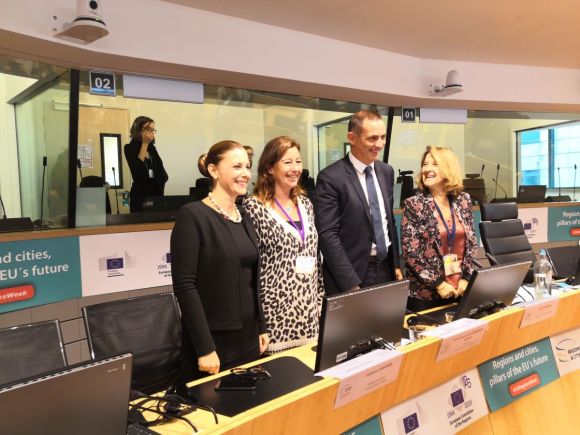
All the islands in the Mediterranean area share the same difficulties but also many goals. For this reason policies has to focus on the concept of mediterranean insularity in order to defend the peculiarities of these vulnerable territories.
“We are little but very resilient. We are peripheric but we are part of the European Union. The EU has to be a real Union”, said Justine Caruana, minister for Gozo, in discussion with Francesca Lluch Armengol Socias, President of the Balearic Islands, Giles Simeoni, President of the Corsican Executive Council, and Eleni Marianou, Secretary General of the Conference of Peripheral Maritime Regions, about “Mediterranean Insularity: challenges and future”.
“The needs of the islands and their citizens are not taken so much in account. For this reason we now speak both with institutions and media” Giles Simeoni says. As he remarks, article 174 of the Treaty on the Functioning of the European Union establishes that: “In order to promote its overall harmonious development, the Union shall develop and pursue its actions leading to the strengthening of its economic, social and territorial cohesion. In particular, the Union shall aim at reducing disparities between the levels of development of the various regions and the backwardness of the least favoured regions. Among the regions concerned, particular attention shall be paid to rural areas, areas affected by industrial transition, and regions which suffer from severe and permanent natural or demographic handicaps such as the northernmost regions with very low population density and island, cross-border and mountain regions”.
Every island is different from another and from the mainland too. The condition of insularity could be “a positive discriminating element” as Simeoni says. However, nowadays Mediterranean Islands are facing important issues that no-one has to ignore.
Islands represent 20 million people and are a strategic area as regards economy, society and environment. However, climate change is affecting their territories: "We are very vulnerable in the Mediterranean sea, that is one of the most polluted because of the increase of the plastic in it. Between Maiorca and Menorca there are more than 3.7 tons of plastic” President of the Balearic Islands says.
Massive tourism is another urgent issue: although it has a positive impact on the economic sector, thanks to the increase of the incomings, it is also one of the reason of the rise of pollution. Moreover, it reveals the limits of the infrastructures of these areas, which are suffering from the lack of transportations facilities.
Furthermore the issue of immigration affects the whole mediterranean area and it requires an urgent action: “Nowadays the Mediterrean sea is a cemetery” says President of Balearic Islands. The shipwreck near Lampedusa last Monday is only one of the many tragedies that prove it.
Climate change, pollution, mobility and migration are global issues, do not concern only islands. Since a new European Parliament has been elected in May and a new European Commission will replace the previous one leaded by Jean-Claude Juncker, the Mediterranean authorities are raising their voice to start a new period of intense dialogue between institutions. “We are not asking to be treated differently, but to guarantee an equal treatment. We are not autonomous territories but we are autonomous areas. For this reason we need measures to face these challenges” Simeoni says.
Cohesion policy has always been one of the most important resources to guarantee the development of these territories. The need of new policies and strategies encouraged representatives from these three islands and Sardinia to come to Brussels, the decision-making heart of Europe, and sign a new declaration for a more inclusive Europe. Indeed, cohesion and cooperation are the most important value to improve human capital and the quality of life, to increase social justice and to fight against disparities.
“We are truly European inside” concludes Simeoni. “We are expecting more from Europe and it means that we believe in it: we believe in Europe”.
Written by: Elisa Tasca (Italy)
Edited by: Iskra Tsankova (Bulgaria)



